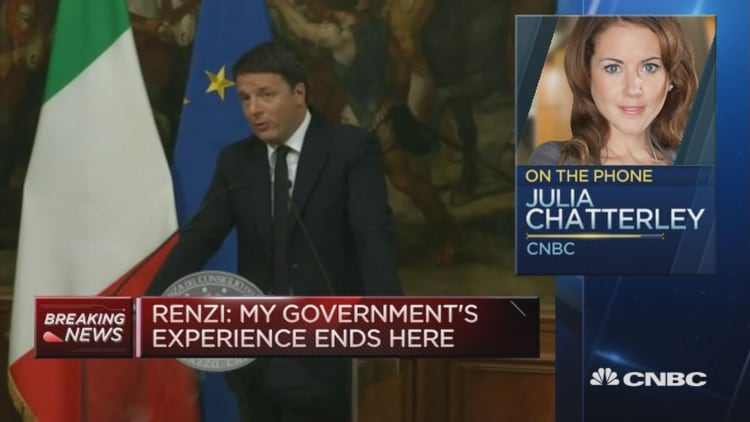Italian President Sergio Mattarella asked Prime Minister Matteo Renzi on Monday to delay his resignation until Parliament passes the budget, which is expected to be approved within days.
Renzi said on Sunday he would resign after suffering a humiliating defeat in a referendum over his plan to reform the constitution, throwing the country and the euro zone into confusion. He said voters had shown a "clear" rejection of legislative reform measures and that he would meet with his cabinet on Monday and then hand in his resignation to the President Mattarella, taking full responsibility for the defeat.
"The experience of my government ends here," Renzi said in a televised address to the nation as results showed his 'Yes' camp was well on track to lose the referendum.
What was originally a rather dry referendum on constitutional change has turned into a high-stakes game with the political and economic stability of Italy—and ultimately the euro zone—at risk.
Sunday's vote was on whether the country's second chamber should be stripped of some of its powers. The country's government is hamstrung by procedure and delays to legislation. A "Yes" vote in the referendum would have meant that laws would only need the approval of the lower house to be passed.
Renzi had pinned his political future on the vote, saying he would resign if a "Yes" vote is rejected.
Populist parties such as the 5-Star Movement had campaigned for a "No" vote, saying the change to the constitution would lead to a concentration of power.

As well as throwing the political future of Italy into doubt, a "No" could hit the country's already-fragile economy hard.
In Asian trade the euro was down 0.90 percent to 1.0574 to the dollar after touching a 20-month low.
Renzi's resignation could lead to early polls in the second or third quarter of 2017, according to analysts, with worries in the near term focused on risk assets.
"This is negative for Italian assets, European shares, the euro and risk assets like shares generally and positive for safe havens like government bonds in "safe" countries and gold and some of this reaction has already been seen today," Shane Oliver, head of Investment Strategy and Chief Economist at AMP Capital Investors in Australia said in a note to clients.
But Oliver added that the stability of the euro zone remains intact.
"More broadly, my view remains that the euro zone is likely to continue to hang together and bouts of market turmoil driven by break-up fears should ultimately be seen as buying opportunities. Just as we have seen since the euro zone crisis began earlier this decade."
However, Megan Greene, chief economist at Manulife Asset Management, told CNBC last week that she believed that the referendum in Italy could also provoke another banking crisis in Europe.
Italy's stricken banks are holding nearly a third of the 990 billion euros (or more than $1 trillion) of unpaid loans at top euro zone lenders, according to the European Central Bank data.
The 14 large Italian banks sit on 286 billion euros (more than $300 billion) of bad loans, debt securities and off-balance sheet items. That corresponds to more than one in every 10 Italian loans. The Italian banking sector has already been performing badly this year, down some 48 percent on the start of 2016.
The high levels of toxic loans are a throwback to the euro zone's financial crisis, and what's worse is that they are stopping the banks from lending more, which could kick-start the Italian economy.
—The Associated Press contributed to this report.

